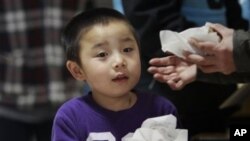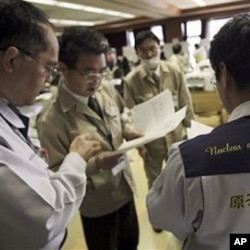Japanese government officials say food and milk contaminated with radiation is being detected in a wider than expected area. Some shipments are now being stopped, although authorities stress that ingesting the items will not immediately harm people.
Japan's government is reporting additional cases of contaminated vegetables. Authorities say the radiation detected on produce, in milk and tap water is more extensive than anticipated following radiation leaks from the crippled Fukushima-1 nuclear power plant, which was severely damaged by a tsunami.
The giant waves hit the northeastern coast of Japan on March 11 following a magnitude 9.0 earthquake.
Japan is now halting the sale of raw milk from Fukushima prefecture and spinach from Ibaraki prefecture. Officials late Sunday revealed that two more vegetables, canola and chrysanthemum greens, have also been found to be contaminated and in three more prefectures.
Further restrictions on distribution of crops grown in the region are being considered.
But officials say even in the worst cases of radiation detected in the food, a person would have to consume the items for a year before health concerns would arise.
At a news conference, the government's deputy chief cabinet secretary, Tetsuro Fukuyama, was asked if he would allow his children to drink the contaminated milk and tap water and eat spinach from the worst-affected areas.
Fukuyama says he does not allow his children to drink milk in the first place, even before this incident or otherwise. But regarding the spinach and the tap water, at the current radiation concentrations, he would not hesitate to permit his children to consume the vegetable or the water.
Officials acknowledge some suspect produce may have been shipped before it could be tested for radiation.
Traces of radioactive substances in the air and water, believed to emanate from the crippled nuclear plant, have been detected as far as Tokyo, 250 kilometers away.
The Japanese minister in charge of consumer affairs and food safety, is appealing via an official web site posting for the public to act calmly and not be confused by groundless rumors from unreliable sources.
The food and water contamination scares are a further headache for Japan's government, already overwhelmed by the triple crises of extensive earthquake damage, destroyed communities from the resulting tsunami, and the disaster at the six-reactor Fukushima-1 nuclear power plant.
The crippled facility continues to emit high levels of radiation as workers attempt to restore power for critical pumps and firefighters in tandem spray water on reactor buildings and re-fill fuel-rod cooling pools.
Yet another concern is on the horizon. Weather forecasters predict rain showers in the area Monday.
Japan's Nuclear and Industrial Safety Agency says the precipitation would not pose any health worries, but given the current levels of radioactivity, people should avoid getting wet while outdoors.






